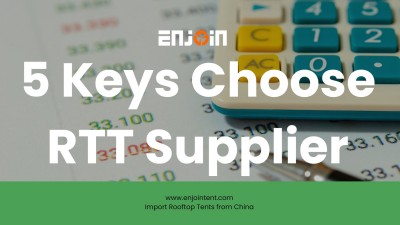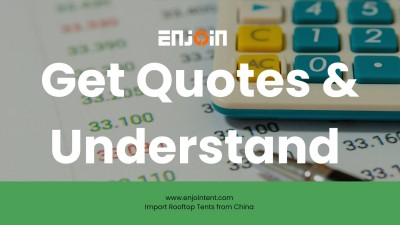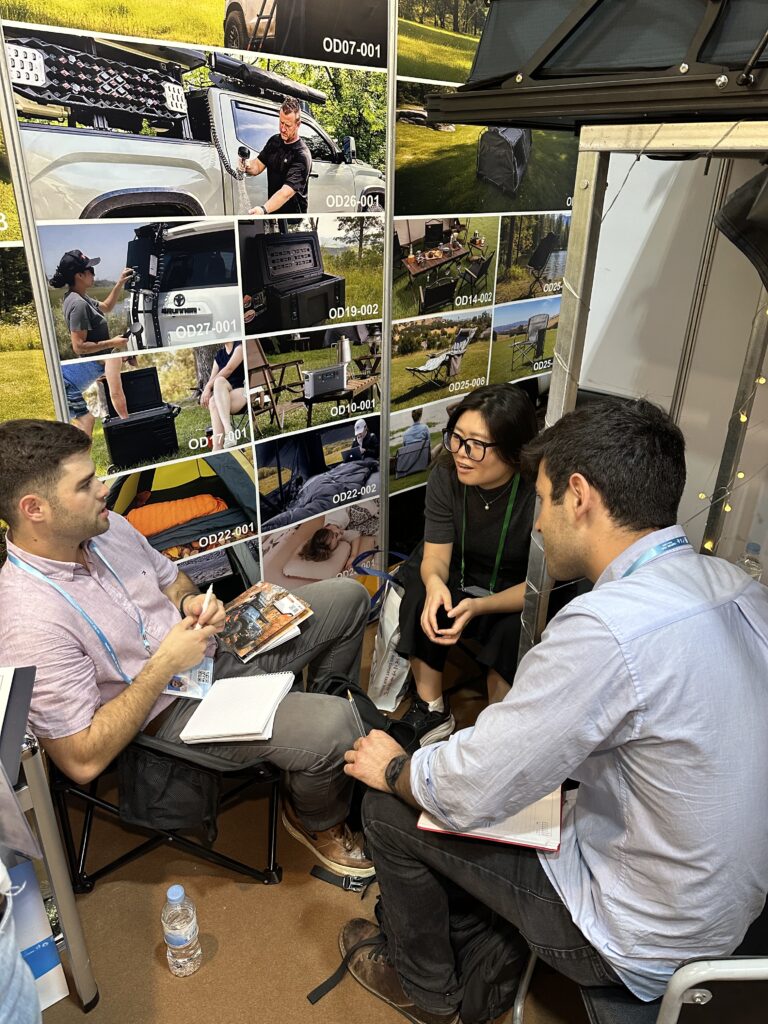If you’re planning to import rooftop tents from China, your first step is to find reliable manufacturers and get accurate quotations from them. But when it comes to large orders, there are many details that affect your total cost — such as trade terms, packaging, and shipping options.
You may have heard terms like FOB, CIF, or DDP, but it can be confusing to understand what each includes, or which one is most cost-effective for your business.
In this section, we’ll go over the most commonly used trade terms when buying rooftop tents and explain when each applies. You’ll also learn some practical tips to help you get precise and transparent quotes from your Chinese suppliers.
1. Why Choosing the Right Trade Term Matters

When you request a quote from a supplier, you need to clarify which trade term (Incoterm) the quotation is based on.
That’s because importers have different needs — some prefer suppliers to deliver to a Chinese port, others want the goods shipped directly to their country or warehouse. The supplier’s responsibility and the total price will vary depending on which trade term is used.
In international trade, there are many Incoterms. But don’t worry — most rooftop tent importers only need to understand a few: EXW, FOB, CIF, and DDP.
These are the four most commonly used trade terms in the outdoor gear industry. Let’s look at each one and see which suits your situation best.
2. FOB, EXW, CIF, or DDP — Which is Best for Rooftop Tent Imports?

When sourcing rooftop tents from China, you’ll often see different price terms such as FOB, EXW, CIF, or DDP. Each trade term includes different levels of cost and responsibility between you and the supplier. Understanding them helps you choose the most suitable one for your business.
FOB (Free on Board)
FOB is one of the most frequently used terms in rooftop tent trading. It means the supplier handles all domestic costs — including local transport, export clearance, and loading the tents onto the ship or plane at the chosen port in China.
Once the goods are on board, the buyer (you) takes over and pays for freight and import costs.
For example:
- A manufacturer in Dongguan might quote FOB Shenzhen, since that’s the nearest major port.
- A supplier in Yongkang or Hangzhou would quote FOB Ningbo or FOB Shanghai.
FOB is the best choice for experienced importers who already have their own freight forwarders or logistics partners. You’ll get better control over shipping costs when ordering large volumes or full containers of rooftop tents.

EXW (Ex Works)
EXW is the factory price only — it doesn’t include any shipping, packaging, or export services. You’re responsible for picking up the goods from the factory and handling the rest of the shipping process.
For example, if you’re ordering sample rooftop tents, EXW is suitable when you already have a shipping agent in China who can collect and export multiple goods together — not just the tent samples. If you prefer the supplier to handle export procedures and deliver the goods to the port, you can switch from EXW to FOB, which usually costs an additional USD 100–250, depending on the factory’s location and port fees.
CIF Price (Cost, Insurance, and Freight)
A CIF price includes the product cost, basic insurance, and sea freight to your destination port (for example, CIF Los Angeles or CIF Hamburg).
This is a convenient option if you don’t have your own freight forwarder or prefer your supplier to handle the ocean shipping. Once the tents arrive at your local port, you’ll need to manage customs clearance and inland delivery to your warehouse.
Keep in mind that the freight fee in CIF only covers part of the journey — from China to your port. The main costs come later: customs clearance, import duties, and local transport to your door.
DDP Price (Delivered Duty Paid)
If you want the easiest and most worry-free option, go for DDP.
It means the supplier handles everything — from the factory in China to your warehouse — including export, import, shipping, and customs duty.
This is perfect for:
-
First-time importers
-
Online store owners
-
Small or medium businesses without a freight partner
With DDP, you get an all-in-one landed cost, making it easier to calculate your profit margin.
Some suppliers may offer DDU (Delivered Duty Unpaid), where you’ll need to pay customs duty before receiving the tents. Even though DDU is no longer in official trade terms, it’s still commonly used in practice.

3. Get Quotations Based on Quantity
If you’re flexible with your purchase quantity but want to know how price changes with volume, ask the supplier for a price breakdown by quantity.
For example:
-
5 sets rooftop tent
-
20 sets
-
1 container (around 50–80 sets, depending on model size)
Most rooftop tent manufacturers or trading teams in China set a minimum order value around USD 2,000–5,000. When your order value increases to USD 30,000 or 50,000, suppliers often offer discounts.
The rooftop tent industry has stable production costs, so prices don’t drop drastically after a certain point. Once you reach a full-container quantity, you’re usually getting the best factory price available.
👉 Tip: Avoid asking for a large-quantity discount (like 100 tents) and then only ordering 10. It can damage trust and make suppliers less willing to offer favorable pricing in the future.

4. Check Packaging & Private Label Costs
When requesting quotes, always confirm whether the price includes packaging and what kind of packaging it is.
For example, a supplier might quote you $850 per rooftop tent including standard carton and protective foam packaging. However, if you need a custom printed box or branded cover bag, there may be an extra cost of $10–$20 per tent, depending on your design and printing method.
If you want to create your own brand, ask about OEM/ODM services in advance — such as logo printing on the tent fabric, ladder, or carry bag. Some suppliers can do this easily, but customization fees (like logo mold setup or printing) are not always included in the initial quotation.

Before placing your order, confirm:
-
Is the logo printing included?
-
What’s the cost per unit for custom packaging?
-
Are there MOQ requirements for custom colors or accessories?
These small details ensure no surprises after payment and help keep your project on schedule and within budget.

5. Confirm Whether the Price Is for Inventory or New Production
When purchasing rooftop tents in bulk, most manufacturers will start production after receiving your order.
However, sometimes suppliers have ready-made stock and may offer it at a much lower price to clear inventory.
While this might seem like a great deal, remember — inventory prices are temporary. Once the overstock is sold out, the next batch will usually return to normal production prices, often 20–30% higher.
If a supplier offers an unusually low price, it’s worth checking if it’s old stock.
Stored tents that have been in the warehouse for a long time might have dust, color fading, zipper rust, or fabric wrinkles, especially if they weren’t sealed properly.
If you want to build a long-term business with consistent quality and repeat orders, it’s always better to order new production.
That way, you’ll get fresh materials, stable color consistency, and the same quality standard each time you reorder.
👉 Tip: Don’t assume the supplier will tell you whether it’s stock or new production — always ask directly before confirming the order.

To Wrap Up
By now, you should have a clearer idea of how to get accurate quotes for rooftop tents and what details to confirm before placing an order.
Choosing the right trade term, checking packaging and customization costs, and confirming production type are key to avoiding surprises and ensuring a smooth sourcing experience.
ENJOIN is a top rooftop tent manufacturer in Chima, we make rooftop tent sourcing simple, safe, and transparent. We support small MOQ, competitive pricing, and OEM/ODM customization — helping your outdoor business grow with reliable quality.
📩 Contact ENJOIN today to get your personalized rooftop tent quote and start your next project with confidence!








